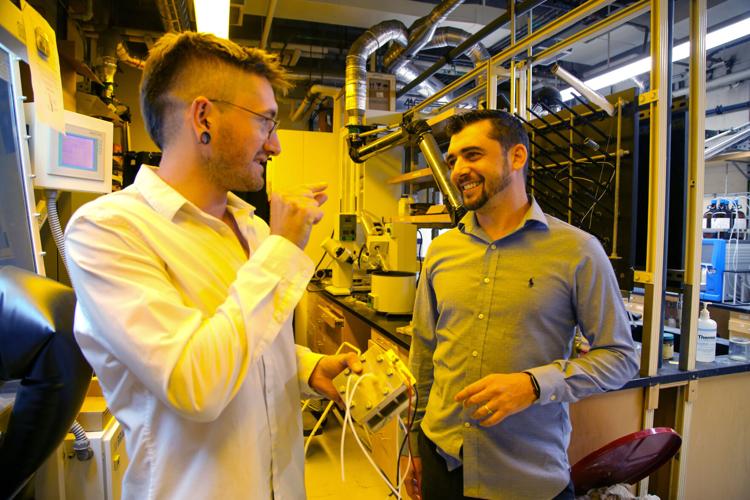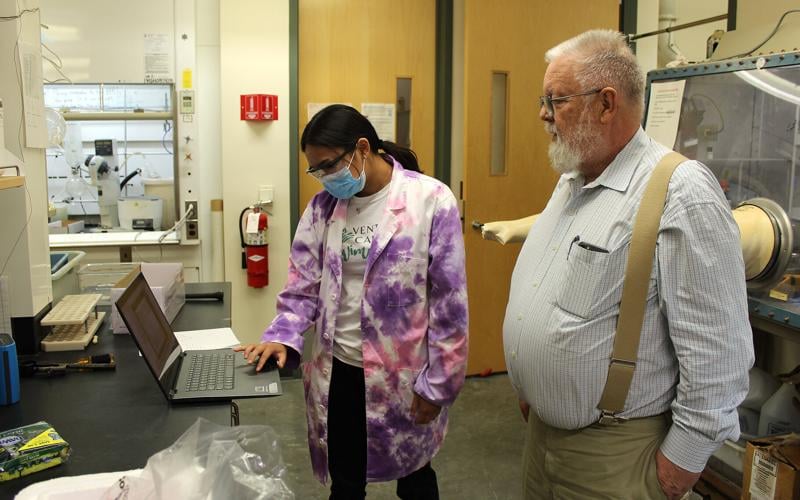University of Arizona faculty members are churning out new inventions at a record pace as the school is pushing more technology into the marketplace.
Tech Launch Arizona, the UA’s technology commercialization arm, recorded 303 new faculty inventions in the fiscal year ended June 30, up from 274 in the prior year — and the most registered for a single year in the university’s history.
Doug Hockstad, UA associate vice president for Tech Launch Arizona, said topping 300 annual invention filings has been a longtime goal, noting the importance of such faculty filings as the raw material for successful licensing deals and startups.
“I’ve been here 9½ years, and I would say more or less from the day we got here, we said our goal was to hit 300, so this was gratifying to hit that mark,” said Hockstad, who joined TLA as director of its technology-transfer office in February 2013 and was named head of TLA in 2017.
But there’s still work to be done as the number of startups TLA helped launch fell to 10 last fiscal year, from 17 in fiscal 2021.
Hockstad said that was partly due to the disruptions wrought by the COVID-19 pandemic.
“All the projects that come into the office that get into the startup funnel, that has shrunk a lot over the last few years, we believe because of COVID,” he said. “And so we’re going to focus a lot on that this year, rebuilding that startup funnel.”

An economic impact report released by Tech Launch Arizona in May shows that startups and business generated through the office supported over 2,500 jobs and $561 million in labor income between fiscal years 2017 and 2021.
Other TLA results from fiscal 2022:
The agency filed 389 patents for new inventions and received 87 issued patents for technologies that had been filed in previous years, compared with 391 filings and 100 patents issued in fiscal 2021.
The office executed 116 licenses and options for UA technologies, down from 124 in fiscal 2021 but second-highest since 2013.
Royalty and other licensing income to the UA was $10.4 million, compared with $8.6 million in the prior fiscal year.
Hockstad said TLA is restarting in-person orientation sessions for faculty, which were moved online at the height of the pandemic.
The lack of personal interaction may have reduced participation in the orientation sessions, where faculty members learn about the technology commercialization process and are encouraged to submit new invention disclosures.
But the virtual sessions also may have captured some faculty members who wouldn’t want to attend in-person, Hockstad said.
“So it’s kind of good and bad — you don’t get as much interaction or as much contact but you might reach some people that you might otherwise not have,” he said.
Despite the challenges, a recent report shows TLA is having a positive impact not only on campus but on the Tucson community as a whole.
An economic impact report released by TLA in May shows that startups and business generated through the office supported over 2,500 jobs and $561 million in labor income between fiscal years 2017 and 2021, producing more than $1.6 billion in economic activity since 2016.
Since the formation of TLA a decade ago, the number of new UA startups has nearly tripled, from 73 to more than 200.
And in the past eight years, TLA says, its startups have raised more than $600 million in grant and equity funding — an indicator that the startups are attractive to outside investors and poised for success.

University of Arizona Professor Robin Polt, right, with undergraduate student Hannah Kuo Feinberg at Teleport Pharmaceuticals LLC. The company, which received assistance from TLA, is developing glycopeptide drugs that penetrate the blood-brain barrier for the treatment of degenerative neurological diseases and conditions.
For a recent example, last November the UA startup NeuroID raised $35 million in a second round of venture-capital funding to help it commercialize technology that reads an online users’ behavior to help fight fraud.
In April, UA startup Auxilium Technology Group won a $300,000 award to build a demonstration plant to produce an insulated foam product from mine tailings, as one of two finalists in an international technology challenge sponsored by Australian mining giant BHP.
Here’s a look at the startup companies TLA helped launch in fiscal 2022, and the UA people behind them:
BG Networks Inc., developing a cybersecurity framework for adaptive risk assessment and automated mitigation. Founded on technology invented by Professor Jerzy Rozenblit and Professor Emeritus Roman Lysecky of the College of Engineering.
Clade Therapeutics Inc., advancing a platform that uses pluripotent stem cells as a basis to develop off-the-shelf cell transplantation therapies. (Arizona Cancer Center Professor Deepta Bhattacharya and College of Medicine – Tucson Research Specialist Hannah Pizzato)
MetFora LLC, using metabolite biomarkers to detect chronic lung disease, heart disorders and cancers in their early stages. (Associate Professors Ruslan Rafikov and Olga Rafikova, College of Medicine)
FAKnostics LLC, developing diagnostics and therapeutics around focal adhesion kinase, the major cancer protein. (Inventors include Dr. William Cance and Assistant Professor Tim Marlowe of the Arizona Cancer Center and the College of Medicine – Phoenix, and Research Scientist Warren Weiner of the College of Medicine – Tucson.)
Fringe Metrology LLC, developing software for high-precision fringe projection metrology, an optical measurement system. (Doctoral student Joel Berkson and Senior Research Associate Justin Hyatt of the James C. Wyant College of Optical Sciences)
CarbeniumTec LLC, organic-based redox flow battery technology for utility, commercial and residential uses. (Assistant Professor Thomas Gianetti, postdoctoral Research Associate Jules Moutet of the Department of Chemistry and Biochemistry)
CoreA Therapeutics Inc., specializing in cancer immunotherapies and antibody-drug conjugates for treating solid tumors. (Dr. David Bull, Associate Professor Youngwook Won and postdoctoral Researcher Daniel Lee of College of Medicine and the BIO5 Institute)
Arizona Assist, LLC, a member-driven marketplace that provides connections between University of Arizona sports fans, programs and players. (Founded initially to commercialize the names, images and likenesses of UA basketball players)
Teleport Pharmaceuticals LLC, developing glycopeptide drugs that penetrate the blood-brain barrier for the treatment of degenerative neurological diseases and conditions. UA chemistry and biochemistry Professor Robin Polt and Associate Professor Michael Heien; neurology and pharmacology Associate Professor Torsten Falk and Associate Professor John Streicher)
Gloss Institute Inc., tools and procedures developed by College of Education Professor Samuel Supalla based on American Sign Language Gloss, a method of describing ASL signing, to help deaf students’ learning and English literacy.
A University of Arizona video aimed at faculty, staff and students explains how Tech Launch Arizona commercializes new inventions.







